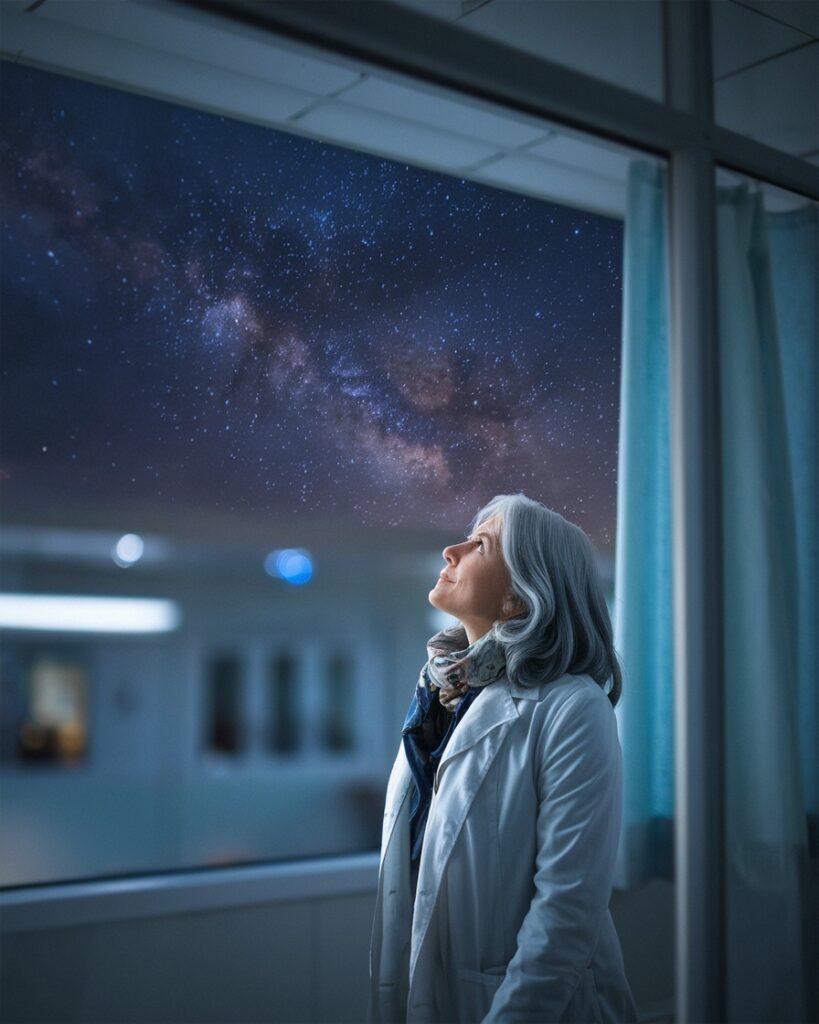<p>The hospital doors hissed shut behind me, sealing away the sterile scent of antiseptic and the hollow beep of machines counting down the seconds of my husband’s life. Eric’s oncologist had just handed me a letter—a cold, clinical summary of his verdict. <em>Weeks, not months.</em> The words blurred on the page as I crumpled it in my fist, my legs carrying me blindly to a bench outside. The sky mirrored my tears, gray and heavy with unshed rain.</p>
<p>I don’t know how long I sat there, my face buried in my hands, the world reduced to the ache in my chest. Grief had carved me hollow, leaving only a shell of the woman who’d laughed with Eric over burnt pancakes that very morning. That’s when I felt it—the weight of someone’s gaze.</p>
<p>“Mind if I sit?”</p>
<p>The voice was soft, frayed at the edges like an old sweater. I glanced up, expecting a nurse offering tissues or a well-meaning platitude. Instead, I met the eyes of a woman in her 60s, her silver hair swept into a messy bun, a threadbare scarf draped over her shoulders. She held two paper cups of steaming tea, one extended toward me.</p>
<p>I nodded numbly, and she settled beside me, her presence calm and unflinching. For a long moment, we sat in silence, the tea warming my palms. When she finally spoke, her words were unexpected.</p>
<p>“I lost my husband to the same thing,” she said, not looking at me. “Pancreatic cancer. They gave him three weeks. He made it twenty-two days.” Her voice didn’t waver, but her knuckles whitened around her cup. “I spent the first fifteen days crying in parking lots. Then, one morning, he asked me to read him <em>The Odyssey</em>—his favorite. We didn’t finish it.”</p>
<p>A lump rose in my throat. “Why tell me this?”</p>
<p>She turned then, her gaze piercing. “Because you still have time. Not to fix it. Not to bargain with God or rage at the universe. But to <em>be</em> there. Fully. Even when it feels impossible.”</p>
<p>She reached into her bag, pulling out a battered paperback—<em>The Odyssey</em>—and pressed it into my hands. “Cancer steals a lot. Don’t let it steal your <em>now</em>.”</p>
<p>Before I could reply, she stood, her smile bittersweet. “The tea’s chamomile. Helps with the shaking.”</p>
<p>And then she was gone, her scarf fluttering behind her like a ghost.</p>
<p>I returned to Eric’s room, the book tucked under my arm. His eyes—still bright, still <em>his</em>—met mine, and for the first time since the diagnosis, I didn’t see the shadows. I saw the man who’d sung off-key to ’80s rock in our kitchen, who’d kissed me in the rain on our first date, who’d whispered, “You’re my favorite adventure.”</p>
<p>We didn’t talk about the letter. Instead, I climbed into his hospital bed, my head on his chest, and read aloud. His fingers tangled in my hair, his laughter rumbling as I butchered the Greek names. That night, we didn’t count days. We counted stars through the window, constellations we pretended were ours.</p>
<p>The stranger’s tea grew cold on the windowsill, forgotten. But her gift—the permission to stop drowning and start living—stayed.</p>
<p>Eric’s weeks turned into a month, then five. And when the end came, we were ready. Not because we’d said goodbye, but because we’d said <em>everything</em>.</p>
<p>I never saw the woman again. Sometimes I wonder if she was real or a fractured piece of my grief, sent to remind me that love isn’t measured in time. It’s measured in moments—stolen, savored, and carried forward.</p>
<p>If you’re reading this and sitting on your own bench, your own letter crumpled in your hand: Breathe. Look up. The strangers who find you might just be angels in threadbare scarves. And the <em>now</em> you have left? It’s worth every heartbeat.</p>
<p>—<br />
<strong><em>For anyone walking through the valley: You are not alone.</em></strong></p>
<p>#LoveAndLoss #GriefJourney #HospitalStories #CherishTheMoments #LifeAndDeath #FindingHope #StrangersHelpingStrangers #EmotionalStories #CancerAwareness #GoodbyeWithLove</p>

The Stranger Who Changed Everything: A Heartbreaking Gift in My Darkest Moment
-
by thebuzzly

- Categories: English Story
- Tags: Cancer diagnosis griefEmotional hospital momentsEmotional stories of love and loss in hospitalsFinding hope in lossFinding strength in grief through strangersHospital goodbye storyHow to cope with a terminal diagnosis of a loved oneLiving fully when time is running outStrangers helping strangersTerminal illness journeyThe impact of small gestures in difficult times
Related Content
The Man, the Mystery, and the Cable: A Medical Case That Stunned a Hospital
by
thebuzzly
10/06/2025
A Nurse, a Photograph, and a Lifelong Memory: Amanda’s Search for the Woman Who Comforted Her
by
thebuzzly
08/06/2025
A Gallon of Kindness: A Boston Officer’s Quiet Act of Compassion Amid Chaos
by
thebuzzly
08/06/2025